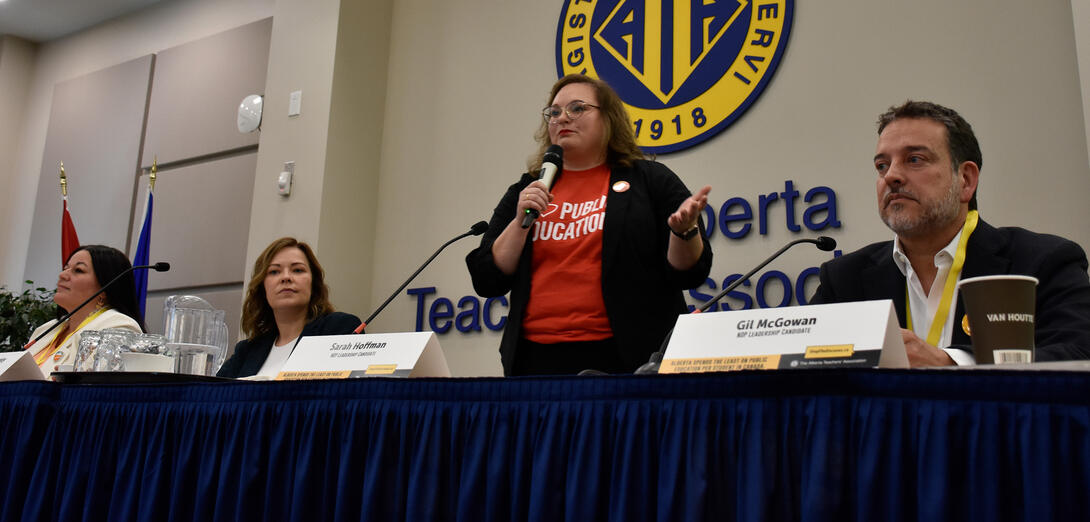The 2024–25 budget developed by Provincial Executive Council (PEC) is continuing to move forward, with the final step being presentation to the 107th Annual Representative Assembly (ARA) for debate and approval by the teacher delegates gathered in Edmonton on the Victoria Day long weekend (May 18–20).
The budget of the Alberta Teachers’ Association is a reflection of the Association’s values, priorities, programs and activities for the upcoming year. Throughout the budget’s development, PEC considered options, deliberated, and made critical choices, balancing financial considerations and member feedback before arriving at the proposed budget to be presented at ARA to delegates. At ARA, the work of delegates will be not only to consider the broad financial implications of the proposal, but also to examine the merit of the proposed programs and consider their value to members, to education and to the Association. We expect delegates will have thoughtful questions to ask, and your elected representatives and staff are ready to answer them.
First, on the staffing side, two new executive staff officer FTEs are included within the proposed budget, with an additional executive staff officer for each of Professional Development and Teacher Employment Services. It is anticipated that the additional staff in Professional Development would be particularly focused on making progress on several initiatives related to the Association’s diversity programming. Further, to assist the work of Regulatory and Membership Support, a professional staff position is budgeted. Next, within Operations, the Association seeks to hire an event and conference facilitator to not only support the event related work of Specialist Councils, but also to promote available rental spaces at Barnett House. As envisioned, this role would assist individual Association subgroups (especially specialist councils) staff in negotiating venue and presenter contracts, leveraging the Association’s purchasing power.
Aligned to the Association’s ongoing commitment to the Truth and Reconciliation Commission of Canada’s Calls to Action, included in the current budget draft are proposals to hold an Indigenous symposium and to pilot an Indigenous education initiatives grant. Next, seeking to expand the support provided specifically to teachers in their early years of service, resources are allocated to establish a Beginning Teachers’ Network. In addition, a new program, focusing on mentorship for school leaders is also planned.
Finally, to support expressions of member diversity, PEC is proposing several initiatives including the creation of new teacher-defined and -driven Diversity and Equity Networks (DENs) and the expansion of the Diversity, Equity and Human Rights (DEHR) committee. Further modifications to existing program design are being made that can be initiated within the existing budget. It is anticipated that additional initiatives related to diversity, and in response to recommendations of the Status of Racialized Teachers subcommittee established at ARA direction in 2021, will be developed and brought to ARA for approval and funding in future years.
Based on feedback from locals, a number of adjustments were made to the budget draft and these have been incorporated into the proposal to be discussed over the May long weekend. Balancing across a number of factors, Council is recommending an annual fee of $1,422 for the 2024–25 fiscal year, marking a $75 increase over the current fee of $1,347.
While examples of budgeted items were included above, the following pages provide additional highlights of new programs and completed or discontinued programs within the proposed 2024–25 budget.
Sample of proposed 2024–25 new initiatives
Indigenous symposium — Professional Development:
The in-person event would bring together Elders, Knowledge Keepers, subgroup leaders, elected representatives, and staff to discuss experiences and review barriers, opportunities, processes and protocol related to having Elders and Knowledge Keepers involved in projects or events.
Beginning teachers’ network — Professional Development:
The intent is to create a mechanism of support that can be accessed directly by beginning teachers, no matter their place or access to mentorship programming.
School leadership mentorship — Professional Development:
The program would be set up parallel to the Teacher Mentorship program in that it would be in the form of a matching grant program with locals. Within this program, locals would have access to a matching grant of up to $2,000 to approach divisions to supplement existing “division only” administrator mentorship programs.
Diversity, equity and human rights meetings — Government:
Focused on the training needs of DEHR chairs at the local level, these one-day training sessions would be offered twice a year and would focus on a variety of rotating topics to empower DEHR chairs to provide leadership in their locals.
Diversity and equity networks — Professional Development:
Envisioned to commence as a pilot, establishing two diversity networks at this time would provide opportunities for the current ATAGSA and Status of Racialized Teachers subgroups to develop a level of autonomy with respect to providing supports to their members.
CTF Women’s Symposium — Government:
The CTF/FCE Women’s Symposium brings together members, staff, and leaders from across the country to discuss relevant issues related to women’s empowerment and advancement. The 2025 conference will be held in Alberta and, as such, the Association will play a role in planning, supporting and hosting this national event. While most of the costs of the conference will be borne by the CTF/FCE, the Association is expected to organize social events to welcome delegates and support networking.
Indigenous Education Initiatives Grant — non-departmental commitments:
The grants will be awarded to initiatives that focus on various aspects of reconciliation, including but not limited to cultural preservation and revitalization; education and awareness; and reconciliation in action. Each eligible initiative would be provided with up to $2,000 per grant awarded.
Completed/discontinued initiatives
The following have been deleted and will no longer be budgeted:
- Nature of Learning — Professional Development (Publications)
- TQS/LQS Credentialing — Professional Development (Workshops)
Proposed annual fee for 2024–25
Provincial Executive Council is proposing an increase of $75 to the Association member fee, taking the full-time annual fee to $1,422.
| 2023–24 proposed fee | 2024–25 proposed fee | |
|---|---|---|
| Total Fee | $1,347.00 | $1,422.00 |
| Funding for programs for which the local rebate does not apply | $153.00 | $204.00 |
| Net fee to distribute | $1,194.00 | $1,218.00 |
| Local rebate at 20 per cent | $238.80 | $243.60 |
| Balance of net fee (80 per cent) | $955.20 | $974.40 |
Budget by program area
There are two parts to the Association’s budget. The first part includes programs funded by the portion of the fee that is subject to a local rebate. In other words, for each dollar of the membership fee that is applied to this part of the budget, 20 per cent is rebated to local associations to fund their operations. Generally, this is referred to as the rebatable section of the budget. The remaining portion of the fee is used to help fund activities and/or programs not subject to the local rebate. This section is often referred to as the non-rebatable section of the budget.
Part 1: Budget subject to local rebate
The table below compares program area expenditures for the 2023/24 approved budget and the 2024/25 proposed budget. It also provides a general description of the mandate of each program area.
| Program area |
Mandate | 2023–24 approved budget |
2024–25 approved budget |
|---|---|---|---|
| Teacher Employment Services |
|
$8,698,600 | $9,284,200 |
| Professional Development |
|
$5,609,800 | $5,740,500 |
| Government |
|
$9,997,000 | $10,278,100 |
| Building |
|
$5,785,000 | $6,100,500 |
| Operations |
|
$3,306,000 | $3,351,700 |
| Nondepartmental commitments |
|
$1,708,200 | $1,777,300 |
| Food Services |
|
$822,100 | $824,400 |
| Information and Technology Services |
|
$2,754,800 | $3,088,100 |

Part 2: Budget not subject to local rebate
Member fees required to fund the second part of the budget are not subject to the local rebate, and 100 per cent of these fees are available to fund provincial Association programs. The table below compares expenditures and allocations for the 2023/24 approved budget and the 2024/25 proposed budget and provides a brief description of the nature of the expenditures.
| Expenditure and allocation | Description | 2023/24 approved budget |
2024/25 proposed budget |
|---|---|---|---|
| Canadian Teachers’ Federation | Provides support for the Canadian Teachers’ Federation based on a per capita fee | $958,300 | $1,007,500 |
| Capital fund | Provides an annual allocation to the fund, which is used to purchase any capital assets and to fund capital projects | $400,000 | $1,000,000 |
| Special emergency fund | Provides an annual allocation to the fund, which is used to fund emergent actions as approved by Provincial Executive Council | $0 | $500,000 |
| Technology services project development | Provides annual funding for projects related to membership application services; online services; unified communications; strategic technology management; and reporting, workflow and form services | $800,000 | $1,365,500 |
| Specialist council membership grants | Provides the annual operating grants to the Association’s 21 specialist councils | $870,000 | $870,000 |
| Accountability Action Plan | Provides funding to support international partnerships focused on advancing system reform, as well as collaboration with subgroups and like-minded teachers’ organizations that advance the profession’s views | $105,000 | $105,000 |
| Mortgage | Provides for principal and interest payments on the mortgages in place for construction and renovations that were completed | $2,323,000 | $2,500,000 |
| Public relations campaign | Provides funding for a multidimensional public relations campaign to highlight the work of the Association and teachers to increase public awareness about the importance of public education and the need for appropriate funding for education | $1,000,000 | $1,000,000 |



